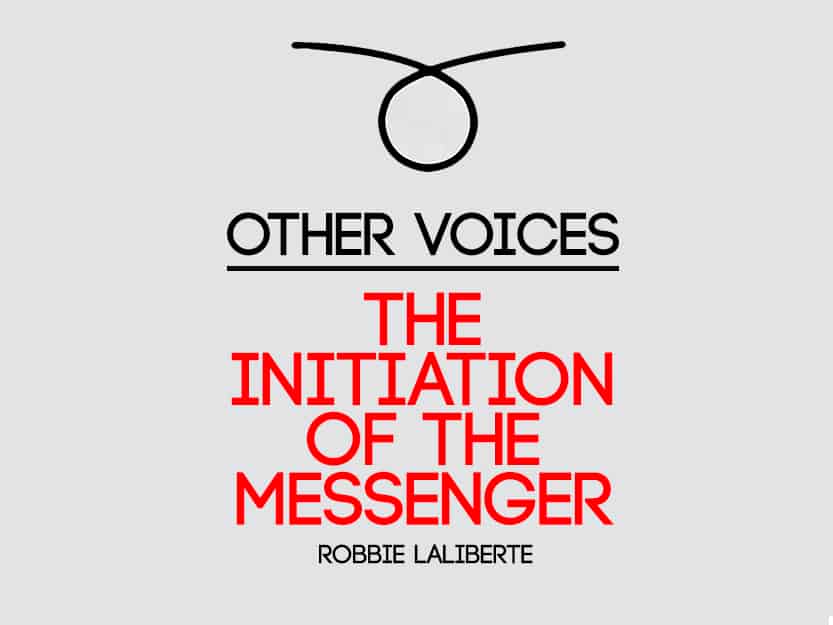Welcome to OTHER VOICES.
Hello good people of the internet, and welcome to a new series here on Adventures In Woo Woo called Other Voices. Basically this series will host guest posts from my favoruite Magick people who I managed to rope in and do some writing for me. To kick the series off we have the great Robbie Laiberte from the wonderful Chariot’s Wheels blog.
So, without any further ado over to Robbie…

Initiation and Intermediary
The Initiation of The Messenger is a ritual for users of the Forty Servants magic and divination system who wish to deepen (or begin) their connection with The Servants. The ritual itself is quite simple, but it does require some effort and dedication from anyone who wishes to undertake it.
The time commitment is likely the largest requirement, as the full ritual (like the Initiation of The Saint, or the Initiation of The Witch) takes 43 days to complete. Any aspirant needs to be able to commit to performing the ritual for this length of time, uninterrupted. That does not mean the ritual will take up all your time for 43 days, just that you must be willing to perform the required elements of the ritual for 43 consecutive days.
Initiation is a concept that most practitioners of magic are quite familiar with. Most have probably undergone an initiation or two in their time. So why another ritual? And why such a lengthy one, at that? An initiation is a symbolic birth or rebirth. It is a dedication of oneself to a group or system. As such, to prove one’s dedication there is an ordeal to endure. This is a common element of many initiations or rites of passages. Magic, by its very nature, is ephemeral. In counterpoint to this, a magician’s commitment must be concrete. A magician does not undertake a task that they do not intend to complete. A magician does not give his word if he does not intended to keep it.
This is why an initiation. This is why an ordeal. Because they are real. They are concrete. They are something the magician has done to prove, if to no one else but themself, their dedication and commitment. An ordeal is an act of discipline and will, two things that are at the very heart of magic.
A feature of many ordeals is the acquisition of a guide or intermediary. This is an ancient concept that recurs in varied traditions from across the globe.
“The gatekeeper, or intermediary spirit (usually Mercurial, but sometimes Solar in nature), is the one who knows how to open the way between the physical and spiritual realms, and knows how to carry your invocations to their target. He is the one who brings spirits to you when you perform evocations, and he is the one who makes your spells work after you’ve cast them.” – Re-Evaluating our Re-Evaluation of the Holy Guardian Angel
In some traditions the guide or intermediary is an absolute requirement for entrance. That is not the case here, but it never hurts to have someone on your side. Through this ritual, the aspirant will forge a connection with The Messenger Servant and through his auspices be introduced to the rest of the Forty. Further, The Messenger will always act as intermediary between the aspirant and the Forty. The Messenger will always be called upon first before interacting with any of the others, and thanks should always be given for his efforts on the magician’s behalf.
 Syncretism
Syncretism
First I bathed in the sea seven times, as Pythagoras taught us. Then I called upon the goddess, naming her Demeter, Aphrodite, Artemis, Persephone, Isis, and Queen of Heaven. … Perfume from her body floated over me.’I am Mother Nature,’ she said, ‘queen of the living and the dead, world, heavens, seas, and underworld. Every people know me by their own name: Artemis, Aphrodite, Persephone, Demeter, Hecate, Ma-Bellona. But in Egypt I am Queen Isis.’
–Lucius Apuleius, The Golden Ass
as quoted: Sarah Ann Lawless, Syncretism as Religion
This ritual, like the Initiation of The Witch, is heavily syncretic. It relies upon the overlap of symbol and function inherent in The Messenger Servant to establish a relationship with a deity. For me, The Messenger deity is Hermes. The invocation I have written uses some of His epithets, but it could be used with a different deity. I recognize that Hermes is not the only Messenger (though many can trace their roots and iconography back to him), so it is not necessary to align with Him to do this ritual. Replace the salient parts with prayers and offerings that are relevant to the entity who, for you, fulfills the role of Messenger.
Symbols accrete. As beings sojourn through Space-Time, symbols accrete. Some persist, others drift away on the eddies.
In Sarah’s blog post (link above), she defines syncretism as “an attempt to reconcile different or opposing principles, practices, or parties, as in philosophy or religion”. Merriam-Webster defines syncretism as “the combination of different forms of belief or practice”. The Apuleius quote might lead one to believe that this syncretism is the same as the Neo-Pagan mantra “All Gods are One God”, but I do not believe this is the case. Many scholars even say that the Ancient Greeks considered Hermes and Thoth to “be the same deity”. If that is so, why then the compound deities such as Hermanubis or Antinous-Osiris? And why bother importing cults wholesale, like that of Isis and Cybele? I think this is a surface reading of the actual practice of syncretism.
Symbols accrete; like seeks like. Symbols accrete. Information congregates to stave off the inevitable approach of entropy.
The Messenger Servant is not Hermes (or whichever messenger deity you identify with), but their functions are the same. They draw on the same universal concepts, they interrelate and overlap. So we use one as a stand-in for the other, as a doorway to enter into their particular realm of symbols. At the same time, we use or forge a personal connection to facilitate or enhance our command of an entire system of symbols (The Forty Servants).
This is the second time I’ve written a ritual using this same basic framework, based on Tommie’s original initiation ritual. Syncretism is not limited to initiation, it can be used in any working. Certain Servants seem more appropriate as intermediaries.
- Zeus or Odin All Father as The Father
- Isis as The Mother
- Papa Legba as The Gatekeeper
I’m sure there are others. Other Servants may reveal themselves in other ways, and have their own syncretisms that might not be appropriate as an intermediary but my help the practitioner identify and access the Servant.
- Archangel Michael as The Protector
- Ganesha as The Road Opener
- Marie Laveau as The Witch
- Selene as The Moon
- Apollon as The Sun
- Santa Muerte as The Dead
 The Ritual
The Ritual
In practice, this is the test that the practitioner must complete in order to be initiated into the world of spirit and gain the necessary spiritual authority to call upon the gods and the dead as this papyri promises. It is analogous to a shamanic soul journey into the spiritual and ancestral realm to make initial contact with a spirit guide.
Voces Magicae: PGM IV 154-285: A Complete Magical System
The Initiation of The Messenger takes 43 days to complete. These days should be consecutive. The practitioner will spend 3 days with The Messenger, establishing rapport. The next 39 days will be spent with The Messenger introducing the practitioner to the rest of the Servants. The last day will be spent again with The Messenger, giving thanks and solidifying the practitioner’s authority in the Forty Servants system.
Required Implements
Offerings’ a complicated business. – Jake Stratton-Kent
This ritual can be performed with absolutely no magical paraphernalia, but I don’t recommend it. That being said, it is highly adaptable and can be inserted into any practitioner’s existing framework.
The following is a suggested list of required implements
- 1 or more large candles (novena type) as an offering to The Messenger; plain white or some other appropriate color
- A consecrated vessel or vessels to hold offerings of water
- A quantity of purified or spring water
- A second candle or 39 tealight candles as offerings to the rest of The Servants (a separate tealight or similar small candle would be preferable, but a second novena candle can also be used)
- Incense
The offering of candles is standard practice in the Forty Servants system. The addition of water is my own contribution, following along with many ancient and modern practices. Other offerings, in addition to or in place of the candles and water are acceptable. If you have a practice or tradition of your own that prescribes certain offerings that feel appropriate to you in this context, by all means make those offerings. But I would recommend these be additions to the basic offerings, not replacements.
Incense is not a requirement (though highly recommended), as noted above none of these are required. If the practitioner simply can not make these offerings for whatever reason, so be it. It does not prohibit one from engaging in the ritual and engaging with The Servants. I’m sure any inventive practitioner can find their own way to make an offering.
Offerings of food, drink, flowers are all acceptable, even encouraged. Make offerings to individual servants, or make a large offering to the entire group on the final day of the ritual. Be sure to dispose of offerings appropriately.
Non-perishable items can also be offered. Crystals, gems, dried flowers, tools, bones… the list is almost infinite. Non-perishable items ought not be disposed of. These items will become power items dedicated to a particular Servant. They should be treated as charms, or magical tools; kept separately and reverently and used when invoking the particular Servant they were dedicated to (perhaps mark the item with the Servant’s sigil to aid in remembering) .
This is not to say that these items can not be offered as a sacrifice. If they are offered as a sacrifice, they should be broken afterwards (if possible) and disposed of appropriately: buried in the earth or cast into the ocean or some other body of water (always do these things responsibly, please).
The Invocations
The Orphic Hymns at HellenicGods.org
We’ll be using three invocations for this ritual, two taken from the Orphic Hymns, dedicated to Hermes, and one specifically written for The Messenger in his syncretic form: Diaktoros.
The Invocation of Diaktoros should also be used any time you invoke The Messenger after this ritual. The Messenger will be your intermediary. He should be invoked before any working you do with The Servants.
The Conjuration of Diaktoros, based on Tommie Kelly’s original initiation ritual is to be used on days 4-42 of the ordeal. Replace, as appropriate, your own name, the name of the Servant of the day and any particular pronouns.
You can find the invocations at this link (Invocations) I placed them in a separate, downloadable file to save space and to have a handier reference.
The Ordeal
A simple framework underlies each day of the ordeal, the particulars differ only slightly.
- While I did state that the rite does not take the entire day, the aspirant should devote idle time during each day to contemplation of the Servant you are working with
- Review available materials on the Servant you are working with, Grimoire, videos, etc
- Establish your ritual space (include some representation of the Messenger, card or sigil)
- Make any offerings of physical objects (this would include lighting candles)
- Commune with The Messenger (and a Servant)
- Make any other offerings (water, food, drink)
- Close the space
Day One
If you are using Hermes as your guide, I would begin on the fourth day of the lunar month, or on a Wednesday, or on a Wednesday in the hour of Mercury. Even better, if the fates align: on a Wednesday that happens to be the fourth day of the lunar month, in the hour of Mercury. But that all depends on how you view magical timing. I only offer this for your consideration.
On the first day, establish your space with your representation of The Messenger in a place of prominence. If you have a representation of Hermes (or whichever divine messenger you choose), have that prominent as well.
Make any offerings of physical objects, including the lighting of your candle for The Messenger (I recommend marking this candle, either by inscribing it or writing on the glass with a marker, both the symbol of Mercury and the sigil of The Messenger).
Recite the Orphic Hymn to Hermes (or whichever divine call you choose that is specific to your divine messenger). The hymn calls for a fumigation from frankincense, so if you happen to have some, feel free.
Spend some time in meditation/communion with Hermes. The time each person spends is going to vary, but I recommend no less than ten minutes and I do encourage a longer time spent: 20-40 minutes would be more appropriate.
Make any other offerings.
Close the space.
Day Two
Proceed as Day One, but substitute the Orphic Hymn to Terrestrial Hermes (fumigation from storax).
Spend some time in meditation/communion with Hermes. The time each person spends is going to vary, but I recommend no less than ten minutes and I do encourage a longer time spent: 20-40 minutes would be more appropriate.
Close the space with these words: “Hermes Epikthonis, pray for us all.”
Day Three
Proceed as the previous days, but substitute The Invocation of Diaktoros.
Spend some time in meditation/communion with Hermes. The time each person spends is going to vary, but I recommend no less than ten minutes and I do encourage a longer time spent: 20-40 minutes would be more appropriate.
Close the space.
Optional Day Four, since 4 is a number sacred to Hermes, repeat Day Two.
Days Four-Forty Two
In addition to your representations of The Messenger/Hermes, for each of these days the practitioner will have a representation of a Servant, card or sigil, in a place of prominence. The idea here is to proceed through the deck, alphabetically, using the Conjuration of Diaktoros to make contact with each of The Servants.
Proceed as the previous days.
Recite the Invocation of Diaktoros followed by the Conjuration of Diaktoros for the Servant of the day.
Commune with the Servant of the day. The time each person spends is going to vary, but I recommend no less than ten minutes and I do encourage a longer time spent: 20-40 minutes would be more appropriate.
Make offerings to Diaktoros and the Servant of the day.
Close the space.
Day Forty Three
The final day of the ordeal. Have the Unifying Sigil in a prominent place along with your representations of Diaktoros.
Recite the Invocation of Diaktoros, the Orphic Hymn to Terrestrial Hermes, and the Orphic Hymn to Hermes.
Commune with Diaktoros. He is now your gateway into the Forty Servants System. Invoke often.
Make an offering to Diaktoros and the rest of the Servants.
Close the space.
Finis
This concludes the Initiation of The Messenger. If you’ve made it this far, you should have established a good working relationship with The Messenger and at least an introduction to each of the other Servants. You want to remember that The Messenger has become your intermediary, He is how you access the Forty Servants system…always invoke Diaktoros first, then proceed to whatever Servant(s) you intend to work with. Diaktoros will assist you in every working.

WHO IS ROBBIE LALIBERTE?
I was a weird kid. The first School of Wizardry I ever attended was on the Isle of Roke in the Great Archipelago of Earthsea. I’ve been studying magic ever since; in speech and silence, sight and scent, flesh and bone. You can find more of my ramblings at my home on the web: http://www.chariotswheels.com. I am deeply indebted to Tommie Kelly for giving me the opportunity to share this with you.
LINKS AND PROMOTION STUFF:
BLOG
– ADVENTURES IN WOO WOO
THE FORTY SERVANTS
– All Info on The Forty Servants
– Forty Servants Altar Cards
– Buy The Forty Servants
– Buy the Grimoire
THE FOUR DEVILS
– INFO AND DOWNLOADS
– SIGNED ALTAR CARDS/ ART PRINTS
MEDIA
– Tommie Kelly Podcast
– Tommie Kelly Youtube
SOCIAL
– Adventures in Woo Woo Facebook
– The Forty Servants Facebook Group
– Twitter
PHOTOGRAPHY
– 500 PX
– FLICKR
– Instagram
–

